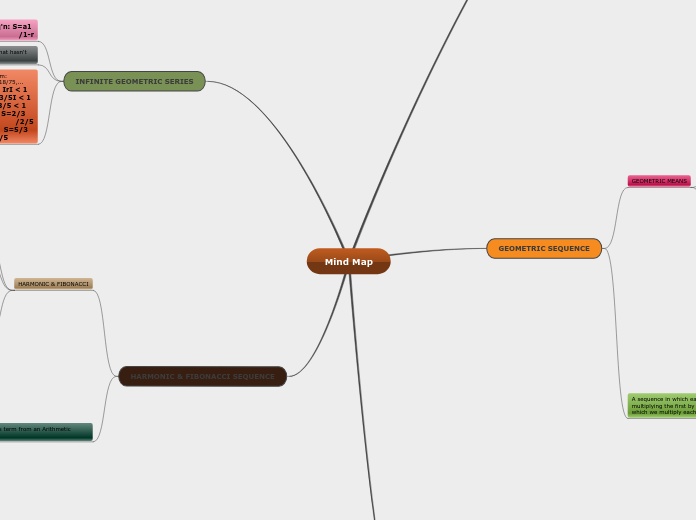
Solution:
An=4n + 7
In order to solve this problem, we must first know A1 to A4. So A1=? A2=? A3=? A4=?
. Now to solve this, we must apply the substitution to the problem. A1=? n=1 A1=4(1)+7
A1=4+7, So A1 is 11
. Now to get the A2, A3 & A4 we can just simply add it by 4 because our term is 4. so the continuos would be A2=15, A3=19 & A4=23.
A sequence can be defined as a function
whose domain has consecutive positive integers
In some cases, Sequence can be denoted as general terms for example:
2,5,10,17,26.... we all know that it is a sequence.
So to get its sum, we first need know what numbers that can add 2,5,10 and so on...So in this situation:
2,5,10,17,26,...
2 when added by 3 is 5. 5 when added by 5 is 10. 10 when added by 7 is 17 & 17 when added by 9 is 26.
So the 5 numbers where just added by 3,5,7,9 which are ODD NUMBERS.
2,5,10,17,26
3 5 7 9
and are added by 2
3 5 7 9
2 2 2
Its general term would be:
An=n2 + 1
Because in this example, the variables 2,5,10,17 & 26,... are being solved by 2 and becomes n2.
And we solve it:
An=n'2 + 1
An=(2)'2+1
An=4+1
An=5
EXAMPLE:
1,3,5,7,9
2,4,6,8,10
GEOMETRIC MEANS
GEOMETRIC PARTIAL SUM
Partial Sum of a Sequence
Sn=A1(1-r^n)
/1-r
Example
Find the indicated sum:
3,6,9,12,24,...S10
Sol'n:
Sn=A1(1-r^n)
/1-r
S10=3(1-2^(10))
/1-2
S10=3(1-1024)
/1-2
S10=3(-1023)
/1-2
S10=-3069
/-1
S10 = 3069
terms between any two nonconsecutive terms
Example
Find 3 Geometric means between 2 & 1250.
Sol'n:
2,10,50,250,1250
An = 1250, A1 = 2 , r=?, n=5
An=A1(r)'n-1
1250=2(r)'5-1
1250=2(r)^4
/2 = /2
625 = r'4
4^{625 = 4^{r'4
/4
r=5
A sequence in which each term after the first is obtained by multiplying the first by a nonzero, constant. The amount by which we multiply each term is called the common ratio (r).
Example
In the geometric sequence 3,9,27,... which term
is 19 683?
Sol'n: An= 19 683
A1= 3
r= 3
n=?
An=A1(r)'n-1
19 683=3(3)'n-1
/3 /3
6 561=3'n-1
3^8 = 3'n-1
/3 = /3
8 = n-1
8+1 = n
9 = n
A9= 19 683 which 3^9 is 19 683.
ARITHMETIC MEANS
between any 2 nonconsecutive terms
Example
Find the Arithmetic means between 5 & 17
5,11,17
An= 17 n=3
A1= 5 d=?
Sol'n:
An=A1+(n-1)d
17=5+(3-1)d
17=5+2d
17-5=2d
12 = 2d
/2 /2
6 = d
ARITHMETIC SERIES
Sn=n/2 [2a1 + (n-1)d]
Example
Find the sum of the first 20 terms of the Arithmetic Sequence 4,9,14,19,...
S20=? n=20
A1= 4 d=5
Sol'n:
Sn=n/2[2a1 +(n-1)d]
S20=20/2[2(4)+(20-1)(5)
=10[8 + 19(5)]
=10[8 + 95]
=10(103)
S20=1030
A sequence in which in the difference with any two successive terms is a CONSTANT.
Example
A12=? A1=9, n=12, d=7
Sol'n:
A12 = 9 + (12-1)(7)
= 9 + 11(7)
= 9 + 77
A12=86
Eq'n: S=a1
/1-r
A series that has a sum is CONVERGENT & series that hasn't have a sum is DIVERGENT.
Find the sum:
2/3, 6/16, 18/75,...
r=3/5 IrI < 1
I3/5I < 1
3/5 < 1
S=a1 S=2/3
/1-r /2/5
S= 2/3 S=5/3
/1-3/5
HARMONIC & FIBONACCI
Fibonacci arrangement of set of numbers.
Example
Find the sum of the first 10 terms:
2:S2=2
3:S3=4
4:S4=7
5:S5=12
6:S6=20
10:S10=143
Harmonic is the reciprocal of its term from an Arithmetic Sequence.
Example
Find the 10th term of 1/2,1/4/,1/6,1/8,...
Reciprocals: 2,4,6,8,...
a10=?
a1=2
n=10
d=2
Sol'n:
A10= 2+10-1(2)
= 2+18
A10=20
A10=1/20
Insert 3 Arithmetic/Harmonic Means of 1/4 & 1/20
1/4,___,___,___,1/20
Reciprocals: d=an-a1
4,8 ,12 ,16 ,20 /n-1
d=20-4
/5-1
d=16
/4
d=4